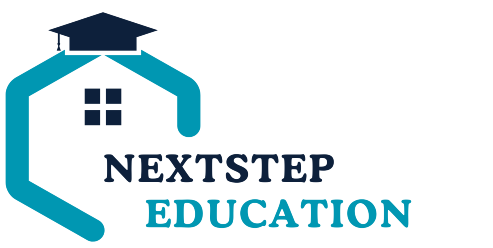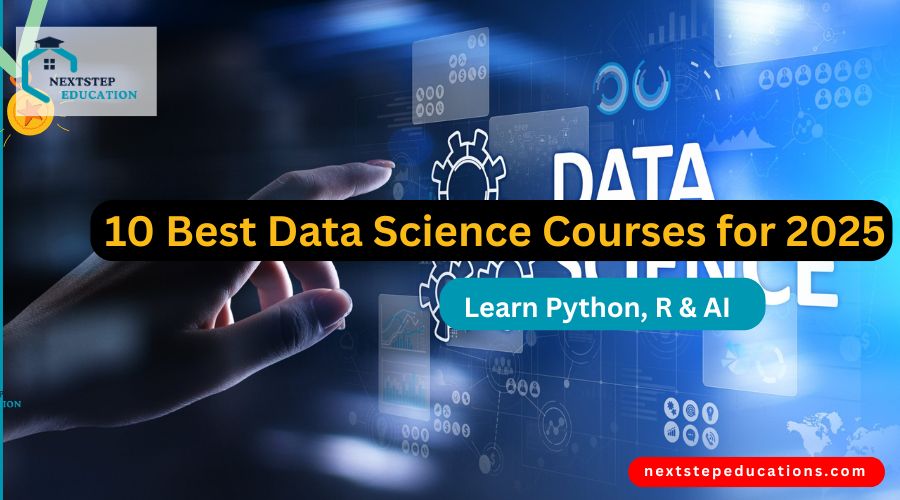Data Science has become one of the most in-demand skills in 2025, driving innovation across industries such as finance, healthcare, e-commerce, marketing, and AI. Organizations rely heavily on data-driven decisions, and professionals with expertise in data analysis, machine learning, and AI are highly sought after. Learning Data Science is no longer optional—it is a strategic career move for anyone looking to excel in tech-driven roles.
To succeed in this field, aspiring data scientists need structured learning paths that cover programming languages like Python and R, statistical modeling, data visualization, machine learning, and business analytics. In this guide, we explore the 10 best data science courses for 2025, including both coding-intensive programs and no-code options for business professionals. Whether you are a beginner, a professional aiming to upskill, or a manager looking to apply data-driven decision-making, this guide has a course for every learner.
“Explore our Top Career Options in India guide to see how data science skills can open doors to high-paying and flexible career paths.”
Criteria for Selecting the Best Data Science Courses
Selecting the right data science course can be overwhelming, given the wide variety of options available online. To help you make an informed choice, we evaluated courses based on several key criteria:
-
Course Content Coverage: Look for courses that teach Python, R, SQL, Machine Learning, AI, and data visualization.
-
Hands-On Projects: Courses that provide real-world projects, case studies, and exercises give practical experience.
-
Certification and Credibility: Recognized certifications from reputable universities or organizations improve career prospects.
-
Accessibility: Consider course duration, cost, online/offline availability, and flexibility.
-
Mentorship & Support: Personalized guidance, live sessions, and expert mentoring can enhance the learning experience.
-
Career Impact: Evaluate if the course prepares you for roles like Data Analyst, Data Scientist, Business Analyst, or AI Specialist.
1. Python Course on Data Science Fundamentals (MIT – edX)
The MIT Python Course on Data Science Fundamentals is one of the most rigorous and comprehensive programs for beginners and intermediate learners who want to build a solid foundation in data science. This course emphasizes computational thinking, Python programming, and basic data analysis, preparing learners to tackle complex real-world problems using programming and data-driven insights. It covers essential topics such as data structures, loops, functions, algorithms, and basic statistical analysis, along with hands-on exercises that help students apply theory into practice.
This course is ideal for students who want a strong understanding of Python for data science and those considering advanced programs in machine learning or AI. One of its major advantages is the MIT certification, which is highly recognized worldwide, enhancing career credibility. However, because the program is intensive, beginners may find it challenging to complete without dedicated time and effort.
Do’s and Don’ts:
-
Do practice coding daily and complete all exercises to solidify your understanding.
-
Do work on additional Python mini-projects to enhance practical skills.
-
Don’t rush through lectures; take time to understand each concept.
-
Don’t skip exercises or assignments—they are crucial for mastering the content.
2. Google Data Analytics Professional Certificate (Coursera)
-
Course Link: Google Foundations of Data
The Google Data Analytics Professional Certificate is a career-oriented program designed for beginners looking to enter the world of data analytics. It provides a structured curriculum covering data collection, cleaning, visualization, and analysis, using industry-standard tools like SQL, Tableau, and Excel. Learners also gain experience in creating reports, dashboards, and actionable insights, making it ideal for those who want a practical, hands-on introduction to data analytics.
This course is particularly suited for students, fresh graduates, and professionals seeking a career shift into data-driven roles, including Data Analyst, Business Analyst, or Junior Data Scientist. One of the biggest advantages is that the course is industry-recognized by Google, which adds credibility to your resume and portfolio. The program is beginner-friendly, with guided assignments and real-world case studies that simulate workplace scenarios.
Do’s and Don’ts:
-
Complete all the hands-on projects to build a strong portfolio.
-
Do practice SQL queries and Tableau dashboards beyond the course exercises.
-
Don’t skip quizzes or peer-reviewed assignments, as they strengthen conceptual understanding.
-
Don’t rely solely on theoretical lessons; apply concepts to real datasets whenever possible.
3. Data Science & AI Certificate with Live Mentoring (Noble Desktop)
-
Course Link: Noble Desktop Data Science Certificate
The Data Science & AI Certificate by Noble Desktop is a comprehensive program designed for learners who want both practical skills and personalized mentorship in the field of data science. The course covers Python, R, machine learning, AI fundamentals, data visualization, and real-world projects, providing students with hands-on experience to tackle complex data challenges. Unlike self-paced courses, this program offers live sessions and expert guidance, which helps students clarify concepts, receive feedback, and stay motivated throughout the learning journey.
This program is ideal for beginners, career switchers, or professionals seeking to deepen their data science and AI expertise while gaining mentorship from industry experts. Students also learn to integrate AI and machine learning into projects, enhancing employability and practical knowledge. The interactive nature and live mentoring set this course apart, allowing learners to simulate real-world workplace scenarios effectively. However, the course is paid and may require scheduling flexibility for live sessions.
Do’s and Don’ts:
-
Do participate actively in all live sessions to maximize learning.
-
Do complete project assignments for hands-on experience.
-
Don’t miss mentor feedback sessions—they are critical for improvement.
-
Don’t skip exercises thinking you can learn passively; practical application is key.
4. Data Science and Financial Analysis Certificate Program (Corporate Finance Institute)
-
Course Link: Corporate Finance Institute Data Science Analyst
The Data Science and Financial Analysis Certificate Program by Corporate Finance Institute (CFI) is specially designed for professionals who want to combine data science skills with financial analysis expertise. This program teaches learners how to use tools like Python, R, and Excel to perform data modeling, economic forecasting, and advanced analytics. It also covers data visualization, business reporting, and dashboard creation, equipping students with the skills needed to make data-driven financial decisions.
This course is ideal for finance professionals, analysts, accountants, and managers who want to enhance their analytical capabilities using data science techniques. One of its key advantages is its focus on finance-specific applications, which makes it highly practical for those in corporate finance or investment roles. However, learners looking for a broader data science curriculum may find the course’s emphasis on finance limiting.
Do’s and Don’ts:
-
Do apply learned techniques to real financial datasets to build practical skills.
-
Do focus on mastering Python or R functions relevant to financial modeling.
-
Don’t skip the dashboards and reporting exercises, as they are crucial for presenting insights.
-
Don’t expect in-depth AI/ML content; the course is tailored for analytics in finance.
5. Data Science for Business Leaders (Pragmatic Institute)
-
Course Link: Pragmatic Institute Data Science Workshop
The Data Science for Business Leaders Workshop by Pragmatic Institute is designed for executives, managers, and non-technical professionals who want to leverage data science for strategic decision-making. Unlike traditional coding-intensive courses, this program focuses on conceptual understanding, practical applications, and business use cases. Participants learn how to interpret data, generate actionable insights, and make informed decisions using analytics tools. The course also emphasizes understanding data pipelines, visualization, and metrics that drive business outcomes.
This course is perfect for business executives, managers, and entrepreneurs who need to integrate data-driven strategies into their operations without writing code. It helps decision-makers understand how data science can optimize processes, improve performance, and create value for their organization. However, it is not suitable for learners seeking hands-on coding experience or technical depth in machine learning.
Do’s and Don’ts:
-
Do focus on case studies to understand real-world business applications.
-
Do collaborate with peers during workshops to exchange insights.
-
Don’t expect technical coding training; the emphasis is on strategic decision-making.
-
Don’t skip exercises that simulate business scenarios, as they are key to applying concepts.
6. R for Data Science (Harvard – edX)
-
Course Link: Harvard Data Science R Basics
The R for Data Science course by Harvard University on edX is a beginner-friendly yet comprehensive program focused on R programming, statistical analysis, and data visualization. This course introduces learners to R syntax, data wrangling, exploratory data analysis, and basic machine learning concepts, making it an excellent foundation for anyone pursuing a career in data science. Students learn how to manipulate datasets, create visualizations, and interpret statistical outputs using R.
This course is ideal for students, statisticians, and professionals who want to gain a strong understanding of R for data science applications. It is also suitable for those interested in analytics-heavy fields such as healthcare, finance, or research, where R is widely used. One of the key benefits is the Harvard certification, which adds credibility and recognition in the global job market. However, learners seeking Python-based instruction or advanced AI/ML content may need to complement this course with additional programs.
Do’s and Don’ts:
-
Do practice R programming exercises daily to build confidence.
-
Do explore real datasets to apply your learning practically.
-
Don’t skip exercises; they are critical for mastering statistical analysis.
-
Don’t rely solely on theory—visualization and practical application are essential.
7. Python for Data Science for Beginners (freeCodeCamp)
-
Course Link: freeCodeCamp Python for Data Science
The Python for Data Science course by freeCodeCamp is an excellent starting point for beginners who want to enter the data science field without prior programming experience. This course teaches Python fundamentals, data manipulation with Pandas, numerical operations with NumPy, and data visualization using Matplotlib. It is structured in a way that allows learners to progress from basic syntax to building practical data science projects, helping them gain hands-on experience while learning core concepts.
This program is ideal for students, self-learners, and career switchers who want a cost-effective, beginner-friendly introduction to Python and data science. One of the major benefits is that the course is completely free, making it accessible to learners worldwide. However, while it provides a solid foundation, the course does not delve deeply into advanced topics such as machine learning, AI, or big data analytics, so learners may need further studies after completing it.
Do’s and Don’ts:
-
Do follow along with coding exercises to practice Python concepts.
-
Do work on mini-projects to reinforce learning.
-
Don’t skip the visualization exercises, as they are essential for understanding data interpretation.
-
Don’t expect advanced ML or AI content; focus on building a strong Python foundation first.
8. Introduction to Data Science Without Coding (DataCamp)
-
Course Link: DataCamp Understanding Data Science
The Introduction to Data Science Without Coding course by DataCamp is tailored for learners who want to grasp the core concepts of data science without engaging in programming. The course covers data exploration, cleaning, visualization, and practical applications of data science in business and research contexts. Students learn to interpret datasets, understand patterns, and draw actionable insights using drag-and-drop tools and visual interfaces rather than code.
This course is perfect for non-technical learners, business professionals, and managers who need to understand the power of data science to make informed decisions. It provides a solid conceptual foundation, allowing learners to communicate effectively with technical teams and contribute to data-driven strategies. The course’s no-code approach makes it accessible to beginners, but it does not offer hands-on programming experience, which may be necessary for advanced roles like Data Scientist or Machine Learning Engineer.
Do’s and Don’ts:
-
Do focus on case studies to understand real-world applications.
-
Do practice interpreting datasets to strengthen analytical thinking.
-
Don’t expect coding exercises; this course is conceptually focused.
-
Don’t skip quizzes and interactive lessons—they help reinforce understanding.
9. No-Coding Data Science Course for Non-Technical Business Professionals (Johns Hopkins – Coursera)
The No-Coding Data Science Course by Johns Hopkins University on Coursera is designed specifically for business professionals, managers, and executives who need to leverage data insights without learning programming. The course focuses on data analysis, visualization, and business decision-making using easy-to-understand tools and concepts. Students learn how to interpret data dashboards, create meaningful reports, and communicate insights effectively to stakeholders.
This program is ideal for professionals who want to enhance their analytical capabilities and make informed, data-driven decisions in their roles. One of the key advantages is that it provides a practical understanding of data science concepts without requiring coding skills, making it highly accessible for non-technical learners. However, it is not suitable for those looking to develop technical programming expertise or pursue a hands-on career in machine learning or AI.
Do’s and Don’ts:
-
Do engage with the case studies to see real-world applications.
-
Do practice interpreting dashboards and reports for business insights.
-
Don’t expect coding or advanced technical exercises.
-
Don’t skip any applied exercises—they are essential for understanding practical business use.
10. No-Coding Data Science on Process Mining (Eindhoven Tech – Coursera)
-
Course Link: Process Mining Data Science
The No-Coding Data Science on Process Mining course by Eindhoven University of Technology focuses on applying data science techniques to analyze and optimize business processes without requiring programming skills. Learners are introduced to process mining methodologies, workflow analysis, and performance evaluation. The course teaches how to extract actionable insights from event logs, identify bottlenecks, and improve efficiency in operations using no-code tools and visual analytics platforms.
This course is perfect for business analysts, operations managers, and process improvement professionals who want to harness data science to optimize organizational workflows. One of its main advantages is that it provides specialized knowledge in a niche area, making learners valuable for companies focusing on operational efficiency. However, it is highly specialized and does not cover general-purpose data science topics such as machine learning, Python programming, or AI, so additional courses may be needed for a broader skill set.
Do’s and Don’ts:
-
Do focus on real-world business cases to understand process improvement applications.
-
Do practice visual analytics techniques for interpreting workflow data.
-
Don’t expect general programming or advanced AI content.
-
Don’t skip exercises; practical application is key to mastering process mining concepts.
Comparison Table of the 10 Best Data Science Courses
| Course | Platform | Duration | Level | Focus | Best For | Price |
|---|---|---|---|---|---|---|
| Python Data Science Fundamentals | MIT (edX) | 9–12 weeks | Beginner/Intermediate | Python, Computational Thinking, Data Analysis | Beginners, Aspiring Data Scientists | Paid |
| Google Data Analytics | Coursera | 6 months | Beginner | SQL, Excel, Tableau, Analytics | Career Switchers, Beginners | Paid |
| Data Science & AI Certificate | Noble Desktop | 12 weeks | Beginner/Intermediate | Python, R, AI, Machine Learning | Learners needing live mentoring | Paid |
| Data Science & Financial Analysis | CFI | 3–6 months | Beginner/Intermediate | Finance, Python, R, Dashboards | Finance Professionals | Paid |
| Data Science for Business Leaders | Pragmatic Institute | 2–3 days | Beginner | No-Code, Business Analytics | Executives, Managers | Paid |
| R for Data Science | Harvard (edX) | 4–6 weeks | Beginner | R Programming, Statistics | Students, Researchers | Paid |
| Python for Beginners | freeCodeCamp | Self-paced | Beginner | Python, Pandas, NumPy, Matplotlib | Beginners, Self-learners | Free |
| Introduction to Data Science Without Coding | DataCamp | Self-paced | Beginner | No-Code, Analytics Concepts | Non-technical Professionals | Paid |
| No-Coding Data Science | Johns Hopkins | 6 weeks | Beginner | Analytics, Business Reporting | Managers, Executives | Paid |
| Process Mining No-Coding | Eindhoven Tech | 4–6 weeks | Beginner | Process Mining, Workflow Analytics | Business Analysts, Operations Managers | Paid |
5. Tips for Success in Data Science Learning
-
Practice Regularly: Coding skills in Python or R improve significantly with daily practice and mini-projects.
-
Work on Real Datasets: Participate in platforms like Kaggle or GitHub to apply your skills.
-
Balance Coding and Conceptual Knowledge: Even if taking no-code courses, understanding basic coding improves employability.
-
Use Visualization Tools: Learn Tableau, Power BI, or Matplotlib to present insights effectively.
-
Build a Portfolio: Include assignments, projects, and dashboards in a portfolio to showcase practical skills to employers.
-
Stay Updated: Data science is evolving—follow blogs, webinars, and online communities to stay current.
6. FAQs About Data Science Courses
Q1: How long does it take to complete a data science course?
Most beginner courses take 4–12 weeks, while comprehensive programs can take 3–6 months.
Q2: Do I need prior coding experience?
Not all courses require coding. No-code courses like Johns Hopkins and DataCamp are beginner-friendly for non-technical learners.
Q3: Which course is best for beginners?
Courses like freeCodeCamp Python for Data Science and Google Data Analytics are beginner-friendly and practical.
Q4: Are free courses sufficient to start a career?
Free courses provide foundational knowledge, but paid and certificate courses are more recognized in the job market.
Q5: Can I get a job after completing an online certification?
Yes, especially if combined with hands-on projects, a portfolio, and practical experience.
Conclusion
Choosing the right data science course is critical for a successful career in 2025. Whether you prefer hands-on coding with Python and R, career-oriented analytics programs, or no-code courses for business applications, there’s a course tailored to your needs. Combining technical and conceptual knowledge can enhance your employability, while building a portfolio of projects ensures practical experience.
From MIT’s rigorous Python program to Eindhoven Tech’s process mining specialization, learners can select courses based on their skill level, career goals, and learning style. Start with foundational courses, progress to advanced programs, and leverage mentorship opportunities to stay ahead in this competitive field.




